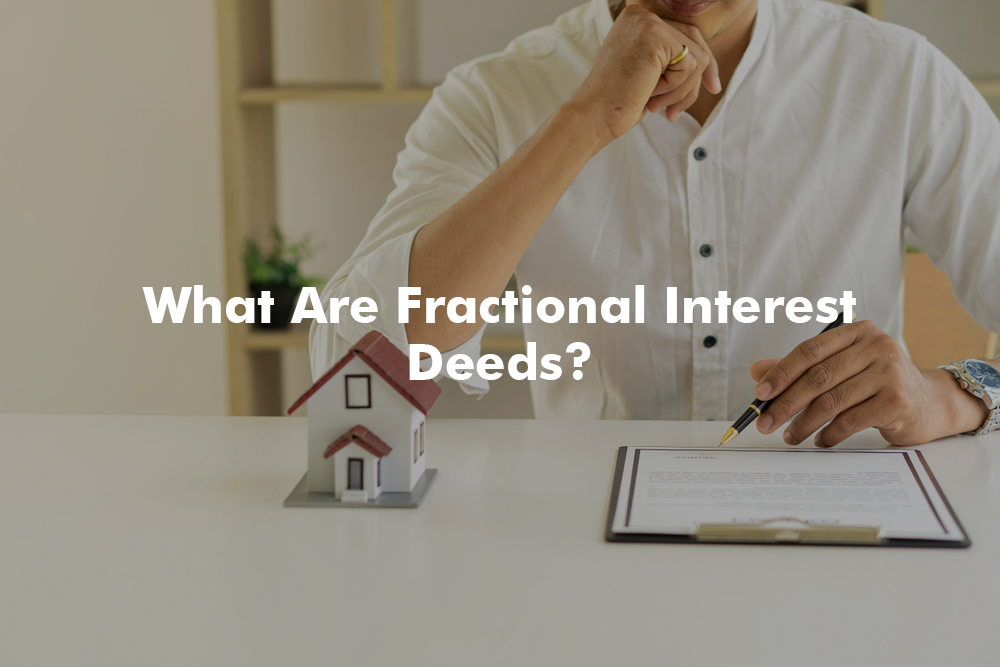In the realm of real estate and estate planning, a fractional interest deed is a legal tool that provides a way for individuals to hold partial ownership of a property. This type of deed is especially important when multiple parties want to share the ownership of a property, each with a specific interest or share. Fractional interest deeds are commonly used in estate planning, where a property might be divided among heirs or other beneficiaries.
Understanding Fractional Interest Deeds
A fractional interest deed conveys only a portion of the ownership of a property to one or more individuals. Unlike traditional property ownership, where one person or entity owns the entire property, fractional interest owners hold a percentage of the property’s total value. This type of ownership is more flexible and is commonly used for investment properties, vacation homes, or in estate planning, where multiple heirs might inherit a single property.
Ownership shares in a fractional interest deed are not always equal. For example, one person might own 50%, another might own 30%, and a third might own 20%. This division is explicitly outlined in the deed, and each owner has rights based on their ownership percentage.
Key Characteristics of Fractional Interest Deeds
Fractional interest deeds have several distinct features that set them apart from traditional ownership deeds:
- Partial Ownership: A fractional interest deed specifies the exact percentage of ownership each party holds. This can be an equal or unequal share, depending on the arrangement.
- Transferable Rights: The ownership rights can be transferred, sold, or inherited. However, all fractional interest owners must agree on decisions such as selling the property or making significant changes.
- Maintenance and Expenses: The fractional owners are responsible for their proportionate share of property taxes, maintenance, and other related expenses. This can be complex, particularly when repairs or renovations are required.
- Access and Usage: In some cases, fractional ownership deeds outline specific usage agreements, particularly for vacation homes. For example, each owner may have the right to use the property during certain times of the year.
- Inheritance and Estate Planning: Fractional interest deeds can play a significant role in estate planning, where property is distributed among several heirs. It allows for the property to be divided without needing to sell the entire asset.
Benefits of Fractional Interest Deeds
There are several advantages to using fractional interest deeds, particularly in estate planning and investment.
- Flexibility in Ownership: A fractional interest deed provides more flexibility in how a property is owned and transferred. For example, a person can sell or transfer their share of the property without affecting the other owners’ rights.
- Simplifies Inheritance: Fractional interest deeds make it easier to divide property among multiple heirs or beneficiaries without forcing a sale of the entire property. This is particularly useful for vacation homes or family properties where emotional ties might prevent a sale.
- Tax Benefits: In some cases, fractional ownership may offer tax benefits. For example, each owner is responsible for a share of the property taxes based on their percentage of ownership. This can make the overall tax burden more manageable, especially for large or expensive properties.
- Increased Investment Opportunities: Fractional interest deeds allow for shared investment in valuable real estate that might be too expensive for a single buyer. This shared ownership model makes it possible to invest in high-value properties and diversify one’s portfolio.
Challenges and Risks Associated with Fractional Interest Deeds
While fractional interest deeds offer many benefits, they also come with some potential drawbacks and risks.
- Shared Decision-Making: All fractional owners typically need to agree on major decisions, such as selling the property or making significant improvements. This can lead to disputes or delays, especially if the owners have different priorities.
- Liquidity Issues: Selling a fractional interest in a property can be more challenging than selling an entire property. Buyers are often less interested in partial ownership, which can make it difficult to find a buyer for your share.
- Legal Complexities: Managing fractional ownership can require additional legal documentation, especially if the owners live in different areas or have differing ideas about how the property should be used.
- Responsibility for Costs: Each fractional owner is responsible for their portion of property-related expenses. If one owner cannot pay their share, the other owners may be forced to cover the shortfall, leading to financial strain and potential disputes.
Fractional Interest Deeds in Estate Planning
In estate planning, fractional interest deeds are often used to distribute property among heirs. This allows multiple heirs to inherit a property without having to sell it or divide it physically. Instead, they inherit a percentage of the property and can manage, use, or sell their share as they see fit.
For example, if a parent owns a vacation home and wants to leave it to their three children, they can use a fractional interest deed to divide the ownership into three equal parts. Each child would then own one-third of the property and have the rights and responsibilities associated with that ownership. The fractional interest deed makes the transfer of ownership seamless and avoids the need for probate or other legal hurdles.
How We Can Help
At Allenby Law, we understand that estate planning can be a complex process, especially when it comes to managing property and distributing assets among heirs. Fractional interest deeds offer a practical and flexible way to divide property ownership, whether for investment purposes or to ensure a smooth transition of assets to your loved ones.
Our team specializes in smart and simplified estate planning solutions, and we can guide you through the process of creating fractional interest deeds that meet your specific needs. Whether you’re looking to share ownership of a vacation home, manage investment properties, or ensure that your heirs receive a fair share of your estate, we’re here to help every step of the way.
Let us assist you in navigating the legal complexities of estate planning, ensuring that your wishes are honored and that your loved ones are well taken care of.



